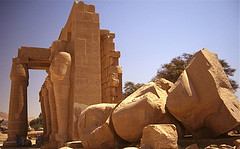One of my first memories of text as something interesting and powerful came from what I at first thought was a ‘dumb’ exercise in public speaking. My Grade 9 English teacher, an Englishman with a blue nose that we suspected was the result of a fondness for pints, required that we memorize and recite a short poem. He offered to help us choose something suitable, and in my case, suggested Shelley’s Ozymandias. As I read it over and over to memorize it, a funny thing happened: I started to like it, I started to appreciate its irony and world weariness. I recited it flawlessly, and can still remember it to this day (though, I admit, I looked it up online to check my memory before posting it below).
I met a traveller from an antique land
Who said: “Two vast and trunkless legs of stone
Stand in the desert. Near them on the sand,
Half sunk, a shattered visage lies, whose frown
And wrinkled lip and sneer of cold command
Tell that its sculptor well those passions read
Which yet survive, stamped on these lifeless things,
The hand that mocked them and the heart that fed.
And on the pedestal these words appear:
`My name is Ozymandias, King of Kings:
Look on my works, ye mighty, and despair!’
Nothing beside remains. Round the decay
Of that colossal wreck, boundless and bare,
The lone and level sands stretch far away”.
–Percy Bysshe Shelley


2 replies on “Ozy”
Thanks for sharing Philip! I think it is great that your grade nine teacher had you memorize a short poem, but more importantly that you were allowed to choose one for yourself. I believe that if you enjoy the text than memorizing it can be (or become) a pleasure, and even more so when many years later you can still recite it! I find this occurs most often with songs, when many years later I surprise myself by still remembering all of the words!
Philip, I had to memorize the same poem in grade 9 and fell in love not only with the poem itself, but with poetry in general. As I memorized it, I began to really understand it. I, like you, can recite the whole poem by memory. I must admit, though, that it didn’t work the same with me when a few years later I had to memorize the “Tomorrow and tomorrow and tomorrow” soliloquy from Macbeth. At the time, I had no idea what it meant. (I do understand – and still remember – it now, however, especially as I teach it every summer and have the students memorize several lines from the play – most choose this one. I don’t think most understand it.)